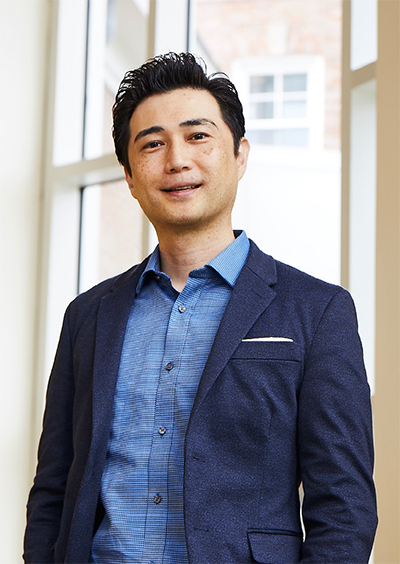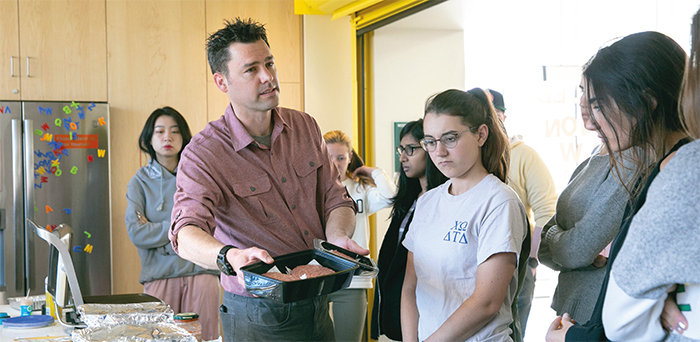Man In Motion
The professor known as ‘Dr. Failure’ leads a bustling, global life

Yasuhiro Yamakawa
Photo: Pat Piasecki
To see Yasuhiro Yamakawa’s online calendar is a bit astonishing. Block after block of time is filled. When others see it, they ask when he has time to eat lunch or dinner.
“We always teach our students to be in action, to learn while doing. I’m just practicing what I’m teaching,” says the associate professor of entrepreneurship, who’s affectionately known as “Dr. Failure” for teaching students to welcome the setbacks that inevitably come in entrepreneurship and business.
Yamakawa has much to keep himself busy. Beyond his work at Babson, he is involved in 16 U.S. and international businesses as an investor, advisor, or board member. Based in Boston, he travels regularly, and he even makes time for a lunchtime ice hockey game three days a week. “I like to be in motion all the time,” he says.
One place Yamakawa frequents is Japan. He was born there, though he moved frequently as a child and continued the wayfaring life as an adult. In all, he has lived in eight countries. “Whenever there was an opportunity for me to jump on something, I moved,” he says.
Once he finally landed at Babson, however, he stopped. He has been at the College for 10 years. He finds it inspiring, and he enjoys interacting with his action-oriented students. “This is the longest I’ve ever stayed in one place,” he says. “I have a good reason. I just love Babson.”
In Japan, Yamakawa leads undergraduate and MBA elective abroad courses. He also is the executive director of Venture Café Tokyo, which hosts a weekly gathering of entrepreneurs, intrapreneurs, investors, educators, and students.
Yamakawa speaks regularly to colleges and companies in Japan. Failure is a frequent topic, which can make businesspeople uncomfortable. “Everyone goes silent,” he says. “Everyone starts looking down.”
Many in Japan see failure as source of embarrassment. So Yamakawa’s message, that failure should be embraced for the many important insights it can offer, is a startling one to Japanese audiences. “It’s all about failing, learning, pivoting, and finding the most successful pathway,” he says.
Yamakawa knows that changing an entire country’s culture is not easy, but when he finishes his talks on failure in Japan, he often receives a standing ovation. – John Crawford
When the Lab Meets the Classroom
David Blodgett integrates his diabetes research into his classes in multiple ways
David Blodgett doesn’t remember anything from his Type 1 diabetes diagnosis just before his third birthday, but that milestone has shaped some of his life’s work in indelible ways.
Blodgett, an assistant professor of biology who joined Babson’s faculty in 2012, also is a diabetes researcher at the University of Massachusetts Medical School, focusing on beta cell gene expression patterns. He and his colleagues examine differences and changes in hormone-producing human pancreatic islet cells, which come from donors who had Type 1 or Type 2 diabetes, were prediabetic, or didn’t have diabetes. Observing those characteristics may be the key to understanding how the diseases develop, and how to treat them.

David Blodgett
Photo: Paige Brown
His academic sweet spot is at the intersection of teaching and research, where he can include some of the processes and findings of his research in classes on human biotechnology and sustainable food systems. “For human biotechnology,” he says, “if we’re talking about reprogramming stem cells to become beta cells, that ties back to genetic engineering and personalized medicine.”
Case Studies in Sustainable Food Systems examines the pathways food takes from farm to table, and includes topics such as food security, technology, GMOs, conventional versus organic farming, food waste, and agriculture and climate change.
In this class, Blodgett highlights his thought processes and the systematic ways of doing research to analyze a situation. “For example, plants that are grown in soil—how is that soil treated, and what are the consequences of those treatments? What conclusions can you reach, which ones can’t you reach, and what additional data do you need? These are the same things I ask myself in my research.”
Blodgett likes having two worlds to work from. “I’m lucky enough to have those two perspectives,” he says, “and I think that makes me a better teacher and a better researcher.” – Jeannine Stein
